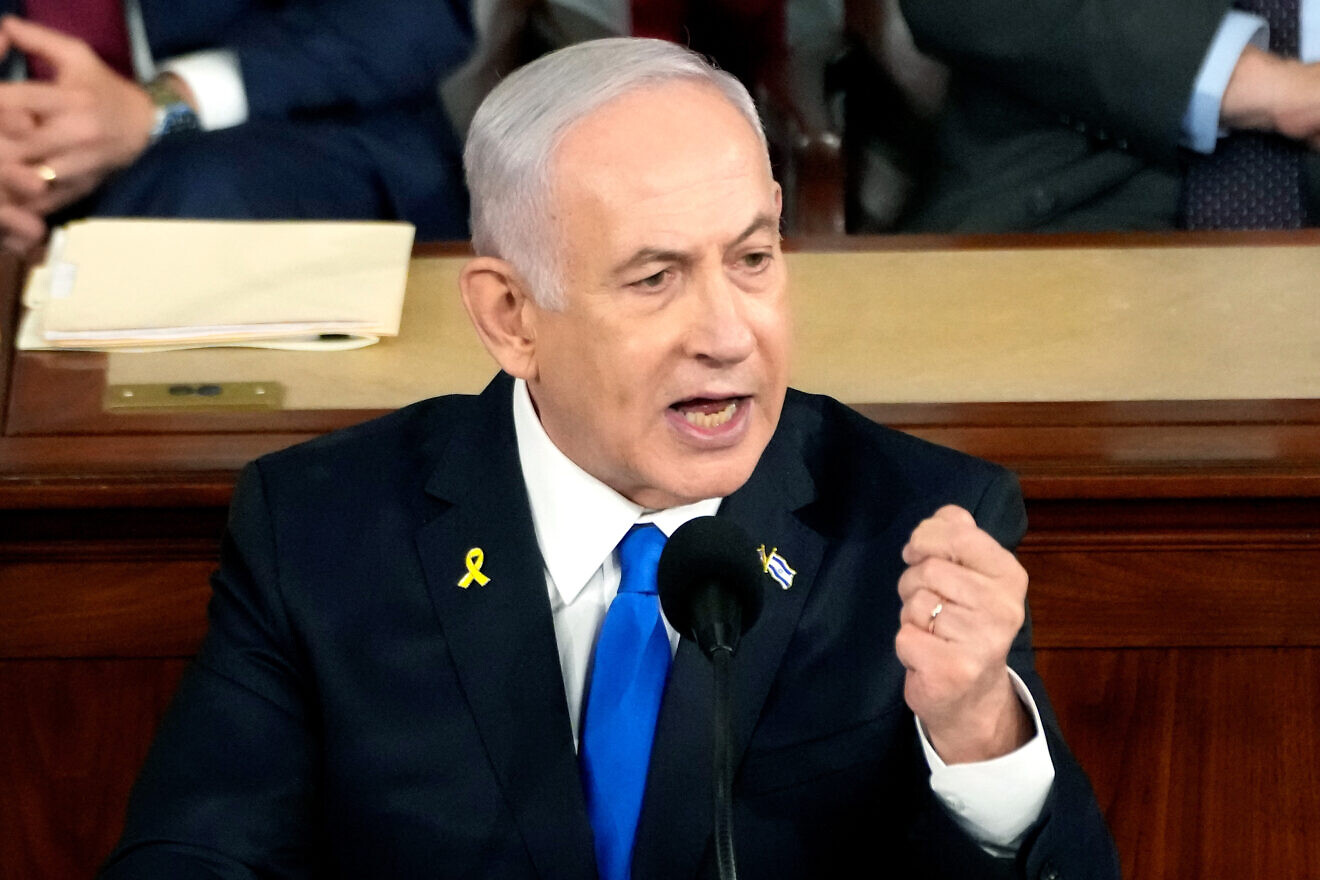 Netanyahu calls for ‘deradicalized’ Gaza, anti-Iran ‘Abraham Alliance’
Netanyahu calls for ‘deradicalized’ Gaza, anti-Iran ‘Abraham Alliance’
UPDATE DESK | Israel At War
The Israeli premier cited the examples of post-WWII Germany and Japan as a model for his vision of “peace, prosperity and security.”
.
 Israeli Prime Minister Benjamin Netanyahu addresses a joint meeting of Congress in the chamber of the House of Representatives at the U.S. Capitol on July 24, 2024 in Washington, DC. Photo by Kent Nishimura/Getty Images.
Israeli Prime Minister Benjamin Netanyahu addresses a joint meeting of Congress in the chamber of the House of Representatives at the U.S. Capitol on July 24, 2024 in Washington, DC. Photo by Kent Nishimura/Getty Images.
Israeli Prime Minister Benjamin Netanyahu on Wednesday laid out his vision for post-Hamas Gaza, calling for the enclave to be “demilitarized and deradicalized” in a manner similar to Germany and Japan after World War II.
Speaking to a joint session of Congress in the Capitol, Netanyahu also called for the establishment of a Middle Eastern defense alliance to confront the threat posed to the region by Iran.
“The day after we defeat Hamas, a new Gaza can emerge. My vision for that day is of a demilitarized and deradicalized Gaza,” said the Israeli premier. “Israel does not seek to resettle Gaza. But for the foreseeable future, we must retain overriding security control there to prevent the resurgence of terror, to ensure that Gaza never again poses a threat to Israel,” he added.
,
.
He called for a Palestinian civilian administration in Gaza, on the condition that it not seek to destroy the Jewish state.
“That’s not too much to ask. It’s a fundamental thing that we have a right to demand and to receive,” he said.
“A new generation of Palestinians must no longer be taught to hate Jews but rather to live in peace with us. Those twin words, demilitarization and deradicalization, those two concepts were applied to Germany and Japan after World War II, and that led to decades of peace, prosperity and security.
“Following our victory, with the help of regional partners, the demilitarization and deradicalization of Gaza can also lead to a future of security, prosperity and peace. That’s my vision for Gaza.”
According to a report by Axios, citing Israeli officials, the United Arab Emirates hosted Israel and the United States in Abu Dhabi last week for a secret meeting to discuss plans for post-war Gaza. One of the scenarios discussed involved a temporary international mission deployed to the Strip, according to the report.
‘NATO-style’ regional ‘Abraham Alliance’
With regard to the regional defense alliance, which he proposed be called the “Abraham Alliance,” Netanyahu said it should include countries that “have made peace with Israel and those that will make peace with Israel.”
The region had already seen “a glimpse” of that alliance on April 13, he said, when Iran launched more than 300 missiles and drones at Israel. A coalition of countries comprising the United States, Israel, Saudi Arabia, Jordan and Egypt successfully neutralized the threat.
The Israeli prime minister thanked U.S. President Joe Biden “for bringing that alliance together.”
In a briefing with the Israeli press delegation following his speech, Netanyahu compared the proposed alliance to NATO. During the address, he said the unified group “would be a security coalition in every sense of the word.”
He said it would essentially be “an extension of the groundbreaking Abraham Accords,” which included normalization agreements signed in the fall of 2020 between Israel, the United Arab Emirates, Bahrain, Morocco and Sudan. And he suggested that the pact be called the “Abraham Alliance.”
Israel would likely attempt to recruit Saudi Arabia to join an alliance, whether or not Israel succeeds in signing a formal normalization agreement with the Sunni kingdom.
In his address, Netanyahu noted that Israel is currently fighting a war on multiple fronts against Hamas, Hezbollah and Houthis, all terrorist proxies funded and armed by Tehran.
“In the Middle East,” Netanyahu said, “Iran is virtually behind all the terrorism, all the turmoil, all the chaos, all the killing.”
Zawartość publikowanych artykułów i materiałów nie reprezentuje poglądów ani opinii Reunion’68,
ani też webmastera Blogu Reunion’68, chyba ze jest to wyraźnie zaznaczone.
Twoje uwagi, linki, własne artykuły lub wiadomości prześlij na adres:
webmaster@reunion68.com
